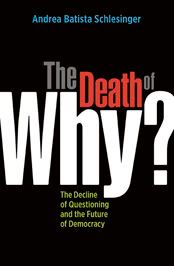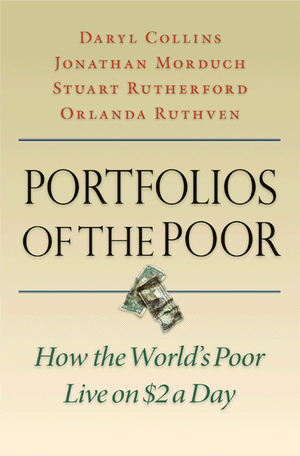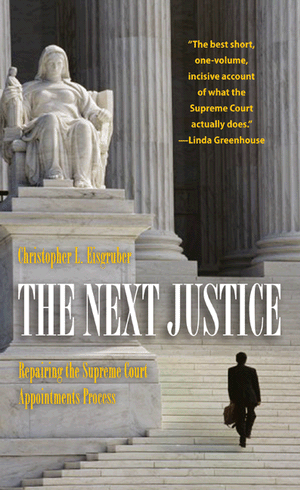Author's posts
Aug 31 2009
We Must Fill the Void Ourselves
The topic below was originally posted yesterday, on my blog, the Intrepid Liberal Journal.
Like millions of my fellow citizens, I am reflecting after the death of Ted Kennedy. Death is an egocentric experience for the survivors. Indeed, rituals such as funerals, wakes or in the Jewish religion “sitting Shiva,” is really about nurturing the souls of those left behind. That is also true when it is a public figure or celebrity that has died. We may never have met them or knew them yet they touched us nonetheless. The Kennedy family understands this better than anyone and is well practiced in rituals that not only honor the dead but comfort the living.
Jul 20 2009
The Death of Why?: An Interview With Author Andrea Batista Schlesinger
 The topic below was originally posted on my blog, the Intrepid Liberal Journal.
The topic below was originally posted on my blog, the Intrepid Liberal Journal.
The phrase “knowledge is power” is a cliché in our culture. Yet as often as we hear it from others or speak it ourselves, how often have we contemplated the process of acquiring knowledge? Is there a blueprint for obtaining knowledge and wisdom? Are we encouraging children to be intellectually curious or merely teaching them that every question has an instant and obvious answer?
In her book, The Death of Why?: The Decline of Questioning and the Future of Democracy (Berrett-Kohler Publishers), New York City policy expert Andrea Batista Schlesinger writes that,
Jul 12 2009
The Ultimate Organizer: An Interview With ACORN’s Founder Wade Rathke
The topic below was originally posted on my blog, the Intrepid Liberal Journal.
It seems no matter which political party in America holds the majority, a Washington/Wall Street corporate centric axis dominates policy making. Indeed, Illinois Democratic Senator Dick Durbin recently observed that banks, “Frankly Own the Place.” Among liberal-progressive activists like myself, this condition has facilitated a confrontational mindset.
Our experience suggests that the power and wealth concentrated in the hands of a few will not be voluntarily relinquished. Hence, everything from healthcare reform to bankruptcy protection for aggrieved homeowners is perceived by many of us as a high stakes pitched battle between struggling families and feculent corporate behemoths. Although activism has certainly facilitated important victories on behalf of working people, fighting for economic justice often seems analogous to climbing an endless wall.
Jun 22 2009
Living On $2 A Day: An Interview With Economist Jonathan Morduch
 The topic below was originally posted on my blog, the Intrepid Liberal Journal.
The topic below was originally posted on my blog, the Intrepid Liberal Journal.
According to the World Bank, almost forty percent of humanity lives on a daily income of less than two dollars per day. Another 1.1 billion scrape by on less than one dollar per day.
How can anyone possibly survive or raise a family with such a meager income? In New York City, two dollars per day won’t even cover my daily Brooklyn/Manhattan round-trip subway commute. Yet billions of low skilled people put food on the table, educate their children, grapple with unexpected emergencies and even save money.
Jun 08 2009
Billy Graham & the Rise of the Republican South: An Interview With Historian Steven P. Miller
 The topic below was originally posted on my blog, the Intrepid Liberal Journal.
The topic below was originally posted on my blog, the Intrepid Liberal Journal.
In the age of Barack Obama, both the Republican Party as well as the South appear marginalized and out of step with the rest of America. Yet it wasn’t so long ago that the South represented the foundation of America’s conservative hegemony. Starting with Dwight Eisenhower in 1952, the Republican Party prevailed in nine out of the next fourteen presidential elections with a reliable Southern base.
Specifically, the Republican Party exploited white Southern resentment against the cause of civil rights and integration. The “Southern strategy” as it was later called, enabled Republicans to end the Democratic Party’s previous domination of the South following the Civil War. A key figure in that realignment was the renowned evangelist Billy Graham.
May 19 2009
Investigating Torture: An Interview With Former Federal Prosecutor Elizabeth de la Vega
 The topic below was originally posted on my blog, the Intrepid Liberal Journal.
The topic below was originally posted on my blog, the Intrepid Liberal Journal.
Former federal prosecutor Elizabeth de la Vega has recently made news urging that we don’t rush into appointing a special prosecutor to investigate crimes of torture during George W. Bush’s presidency. In a provocative April 20th post entitled “Of Black Holes and Radio Silence,” Ms. de la Vega wrote:
“There is no doubt that sometime in 2002 – if not before – Bush administration officials and their lawyers began orchestrating a torture campaign, which they calculatedly attempted to justify through specious legal memos. They continued to abuse prisoners, and to conceal that mistreatment from Congress and the public, through at least 2008. In all of this conduct, they have committed grave crimes for which they must be held accountable. I believe this to be a national imperative of the highest order.”
May 18 2009
The Next Justice: An Interview With Legal Scholar Christopher L. Eisgruber
 The topic below was originally posted on my blog, the Intrepid Liberal Journal.
The topic below was originally posted on my blog, the Intrepid Liberal Journal.
President Obama will soon announce his nominee to replace retiring Justice David Souter on the Supreme Court. It’s a critical nomination with long-term ramifications for civil liberties, executive power, management-labor relations, the environment and consumer rights. Hence, it is vital the public know whether the judicial philosophy and ideology of any prospective nominee to the court is compatible with their sensibilities and values. Ideally, all nominees would be forthcoming about their philosophy as the senate either confirms or rejects them with full knowledge of the sort of justice they’re likely to be.
Regrettably, that hasn’t occurred since the 1987 Senate confirmation hearings for Robert Bork. At the time, Bork scared the hell out of me and I’m grateful his nomination was not approved. Even so, I always respected how Bork was upfront about his ideology and judicial philosophy. Bork didn’t hide what he was and the American public and the Senate had a clear picture of what sort of justice he would be.
Sadly, since the Bork nomination fight, our Supreme Court appointments process has become a Kabuki dance existing in an alternate reality. Nominees are conditioned to reveal as little as possible about their judicial philosophies or even avoid acknowledging they have one. A pitiful example is Chief Justice John Roberts who famously compared Supreme Court justices with baseball umpires during his 2005 Senate confirmation hearings:
“Judges are like umpires. Umpires don’t make the rules; they apply them. The role of an umpire and a judge is critical. They make sure everybody plays by the rules. But it is a limited role. Nobody ever went to a ballgame to see the umpire.”
Apr 12 2009
The Democracy Index: An Interview With Law Professor Heather Gerken
 The topic below was originally posted on my blog, the Intrepid Liberal Journal.
The topic below was originally posted on my blog, the Intrepid Liberal Journal.
On January 1, 2007, Yale Law School professor Heather Gerken published a widely read article in the LegalTimes entitled, “How Does Your State Rank on The Democracy Index.” Gerken argued that just as the Environmental Performance Index (“EPI”) shamed countries such as Belgium to upgrade their environmental practices, a “Democracy Index” would embarrass state and localities into reforming their electoral administration through competition.
Since Bush vs. Gore in 2000, the debate about electoral reform has been dominated by anecdotes and overheated abstractions. Liberals like me have long suspected that states such as Ohio and Florida were deliberately disenfranchising minority voters sympathetic to Democratic candidates. Conservatives complained that voter fraud and urban political machines were allowing ineligible voters to cast ballots at the expense of Republican candidates. With her article, Gerken contended that a Democracy Index would replace a debate dominated by shouting with data driven arguments instead:
Mar 29 2009
Max Baucus Is A Corporatist Class Warrior
The topic below was originally posted yesterday evening at the Intrepid Liberal Journal.
A personal friend and avid reader of my blog recently complained that,
“You’re too tough on Democrats and Barack Obama. Since the election you’ve fired more rhetorical bullets at Democrats than Republicans.”
Mar 23 2009
Come Home America: An Interview With Truth Teller William Greider
The topic below was originally posted on my blog, the Intrepid Liberal Journal.
I first became aware of William Greider after the publication of his 1981 Atlantic Monthly profile of President Reagan’s embattled Office of Management and Budget Director (“OMB”), David Stockman. At the time I was just a kid and the Reagan administration insisted they could simultaneously balance the budget, cut taxes and increase defense spending exponentially.
Greider’s reporting however exposed that even Stockman, doubted the fiscal prudence of Reaganomics. After the article’s publication, Stockman absorbed public humiliation when President Reagan took him “to the woodshed.” I trace that article as a seminal moment in my own political awareness.
Mar 15 2009
Clarence Darrow & Yogi Berra
The topic below was originally posted at the Intrepid Liberal Journal.
Arguably America’s greatest trial lawyer, Clarence Darrow, famously once said,
“First and last, it’s a question of money. Those men who own the earth make the laws to protect what they have. They fix up a sort of fence or pen around what they have, and they fix the law so the fellow on the outside cannot get in. The laws are really organized for the protection of the men who rule the world. They were never organized or enforced to do justice. We have no system for doing justice, not the slightest in the world.”
Reading this morning’s headlines about A.I.G. utilizing nearly $165 million of their $170 billion tax payer financed bailout for bonuses, reminded me of Darrow’s insight. The excuse being offered after all is that a “contract is a contract” and A.I.G. must fulfill their obligations.
Isn’t it curious how contracts are deemed sacrosanct for Wall Street beneficiaries but not blue-collar members of unions in the auto industry? Unions are expected to get “realistic” and ” renegotiate” their contracts but moneyed elites are allowed to carry on as before. Anyone who has the temerity to point out the contradiction is “unreasonable,” “angry,” “extreme,” or heaven forbid, one of those “crazy left wing bloggers.”
Feb 14 2009
Bipartisanship No, Working Majority Yes
The topic below was originally posted on my blog, the Intrepid Liberal Journal.
In the grown up world, honorable and reasonable people may initially disagree but eventually compromise upon a collective review of empirical evidence. It was in this spirit, that the nascent Obama administration reached out to Republicans with respect to their proposed American Recovery and Reinvestment Act of 2009, which finally passed both houses of congress yesterday.







